Greece between Russia and Turkey
Even though Greece cannot be compared to Russia and Turkey in military terms, she plays a very important role in the energy game that is taking place between these two countries.
Picture 55
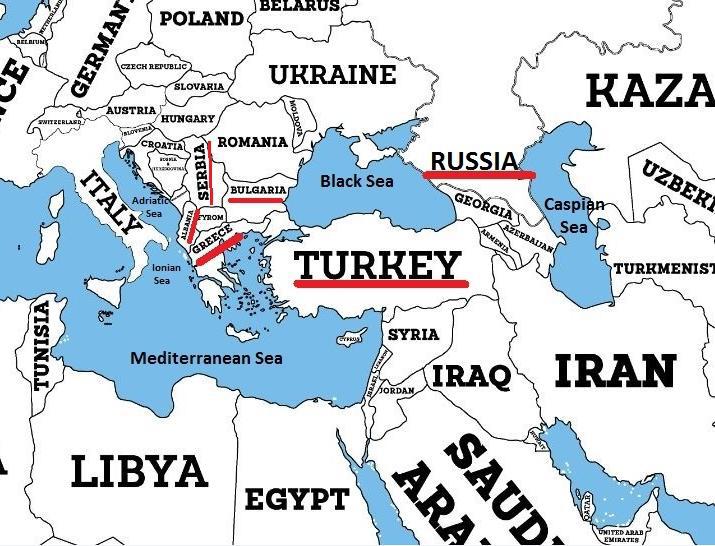
Τhe Christian Orthodox church is the main religion in Greece, Russia, Bulgaria and Serbia, while Turkey and Albania are predominantly Muslim countries. Greece, Serbia and Bulgaria form a wall which prevents Turkey from reaching Albania, the Adriatic Sea and Southern Europe. It would be much better for Turkey if Albania and Turkey were geographically connected. If that was the case Turkey could send the natural gas and oil of the Middle East and the Caspian Sea to the Adriatic Sea and Italy, through Albania, without having to rely on Russian allies. Moreover, as you can see at the following map, if the Islamic State, which is supported by Qatar and Turkey, manages to secure a land corridor in Syria and Iraq, Turkey could reach the Persian Gulf bypassing the governments of Syria and Iraq, which currently are under Iranian and Russian influence.
Picture 56
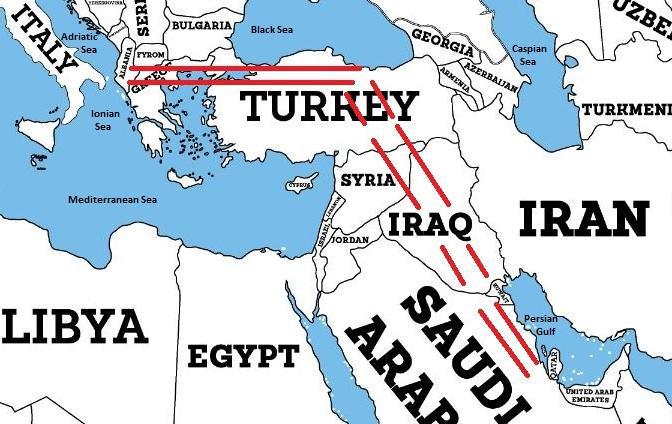
The red area at the following map shows the areas of Syria and Iraq which were controlled or contested by ISIS at the beginning of 2015. The Islamic State has done a good job in order to break the Iran-Iraq-Syria axis.
Picture 57
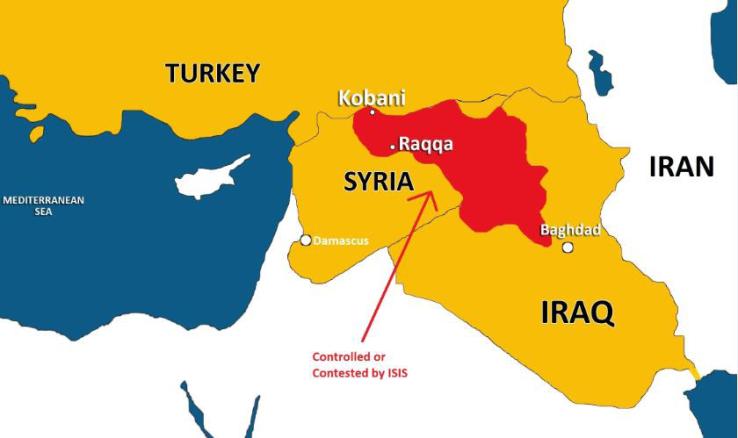
But even if the Islamic Army does not manage to connect Turkey with the Persian Gulf, there might be regime changes in Syria and Iraq, which might move these countries from Iranian towards Turkish and Qatari influence. Sunni Muslims constitute the majority in the Syrian population. Therefore Turkey and Qatar, which are predominantly Sunni countries, might manage to gradually outweigh the Iranian influence in Syria, because Iran is a predominantly Shia (Shiite) Muslim country. Shia Muslims constitute the majority of the population in Iraq.
If one way or the other Turkey manages to reach the Adriatic Sea and the Persian Gulf it would be a revival of the Ottoman Empire. Turkey would partly undo the results of the Balkan Wars of 1912-1913 and the results of the First World War for Oil 1914-1918, which cost Turkey her European and Middle Eastern territories. As you can see at the following map, before the Balkan Wars and the First World War, the Ottoman Empire was stretching from the Persian Gulf to the Adriatic Sea.
The Ottoman Empire before the Balkan Wars of 1912-1913
Picture 58
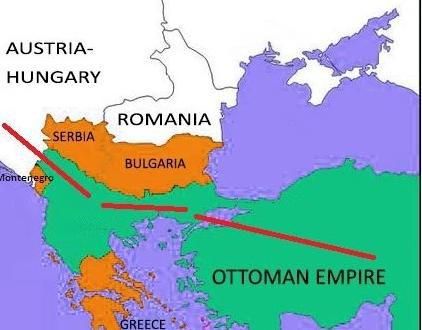
The Ottoman Empire before the First World War for Oil 1914-1918
Picture 59
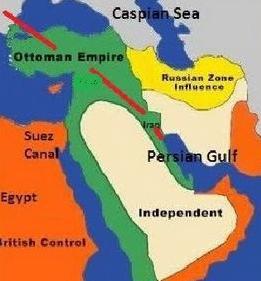
Europe in 1900
Picture 60
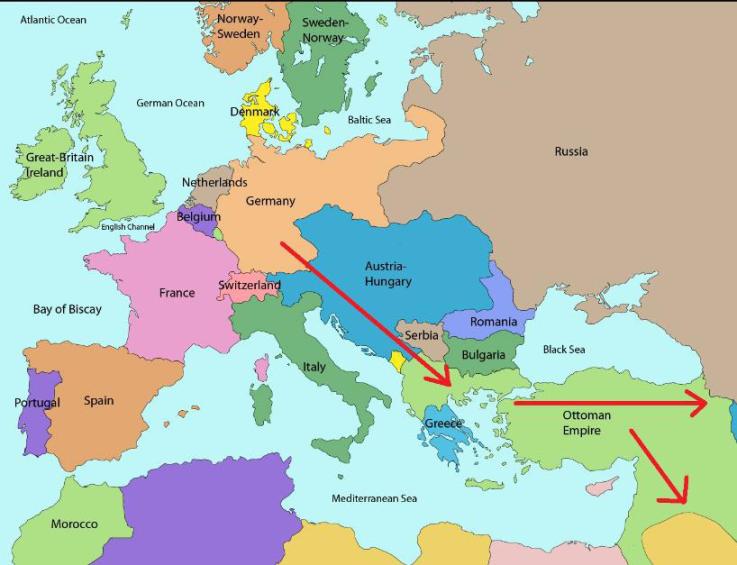
During the Balkan Wars of 1912-1913, England, Russia and France helped Greece, Serbia and Bulgaria, to annex the European parts of the Ottoman Empire, in order to prevent Germany from constructing the Baghdad Railway. The Baghdad Railway would connect Germany to the Persian Gulf and the Caspian Sea, through her allies i.e. the Austro-Hungarian Empire and the Ottoman Empire. When Greece, Bulgaria and Serbia annexed the European territories of the Ottoman Empire, they formed a wall between the Austrian Hungary Empire and the Ottoman Empire, as you can see at the following map.
The results of the Balkan Wars of 1912-1913
Picture 61
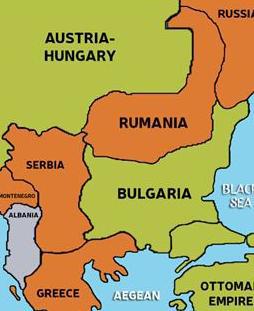
The following map shows the alliances of the First World War. The Ottoman Empire was on the side of Germany, Austro-Hungary and Italy, and Greece and Serbia were on the side of England, France and Russia.
Picture 62
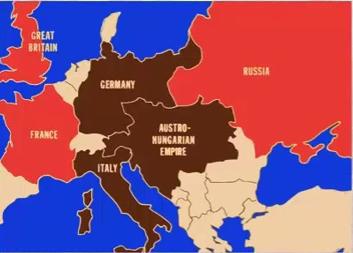
Moreover England, with the help of the Arabs, annexed the Middle Eastern part of the Ottoman Empire. Iraq and Palestine were created, which were under British control, and Syria and Lebanon were also created, which were under French control, as you can see at the following rough map.
The Middle East after the First World War.
Picture 63
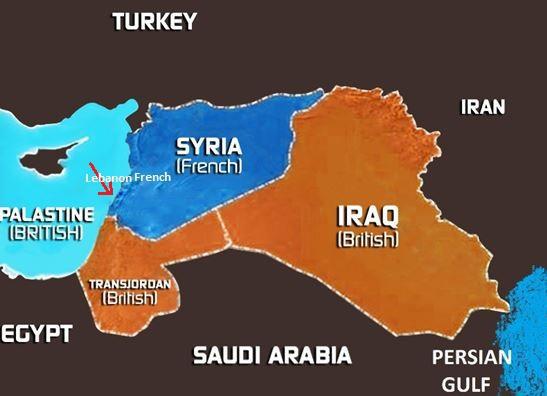
For more details on how the allies chopped the Ottoman Empire in order to prevent the connection between Germany and the Persian Gulf see my essay 'The First World War for Oil 1914-1918'.
Even though in Northern Greece there are regions which are predominantly Muslim, it is very difficult for Turkey to annex these territories and connect to Albania and Italy, as long as Greece is a member of the European Union. After all, as long as Greece is a member of the EU she has to support the TANAP-TAP projects, which are of vital importance for the EU, the US and Turkey. Moreover Greece is a Russian ally, and could not object to the construction of the Turk Stream pipeline either, if the EU was to approve at some point the Turk Stream.
However it is not clear whether it would be better for Turkey to annex the northern part of Greece in order to reach Albania and Italy, or whether it would be better for Turkey to construct the TANAP pipeline without any border changes. In military terms Turkey and Albania have a clear advantage over Greece, and regaining the European parts of the Ottoman Empire is probably a dream for Erdogan. On the other hand, if there was a war in Northern Greece, Russia would make sure that the Greek army had enough weapons to attack the zone occupied by the Turks, in order to prevent the construction of the Trans-Adriatic pipeline (TAP).
But even if Turkey managed to completely neutralize the Greek Army, she could not construct a pipeline network which would send the Caspian natural gas to Europe. The occupied territories would not be recognized by the international community, and it would be impossible for the European countries to have commercial ties with them. Therefore the TANAP-TAP project could be dead for Southern Europe, at least for a while. It is true of course that Turkey has the alternative of FYROM (Former Yugoslav Republic of Macedonia), as you can see at the following map.
Picture 64
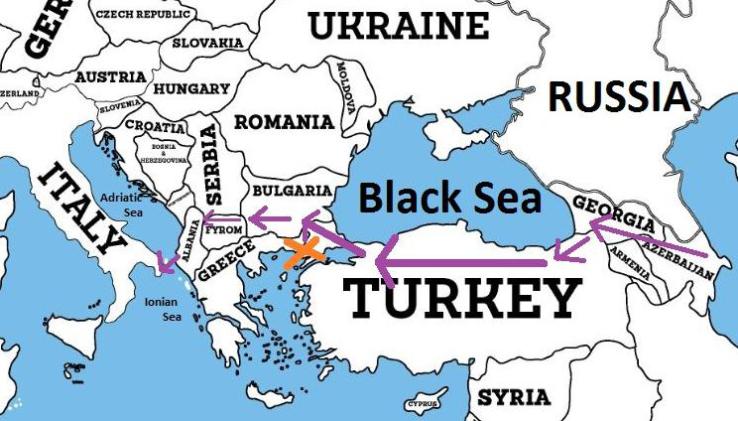
The orange X depicts a potential battlefield on the Greek-Turkish borders. As you can see a pipeline network could be constructed following the route Turkey-Bulgaria-FYROM-Albania-Italy. This scenario could be even better for Turkey, because she could gain some of the Greek territories that she lost during the Balkan Wars. After all Turkey and FYROM have excellent relations. That's why the United States, Turkey and NATO have been trying for many years to bring FYROM into NATO and the EU. NATO countries believed that if Former Yugoslav Republic of Macedonia is not brought into NATO, it will eventually end up in the Russian sphere of influence. And they seem to be right in their judgement.
However as you can read at the following Euroactiv article, titled 'Time to unblock Macedonia's accession to NATO', April 2013, FYROM's membership is blocked by Greece. Greece is the only NATO member which opposes the FYROM membership.
1st Paragraph
Greece's ongoing objections to Macedonia's membership in NATO demonstrates that unlimited veto power threatens to make the alliance less responsive, restrictively bureaucratic, and subject to the mercy of any internal disagreement, no matter how small, writes Sally A. Painter.
6th Paragraph
Indeed, Macedonia has made dramatic progress in its effort to join both NATO and the EU. In addition to its economic and political reforms, Macedonia has been an active contributor to NATO‘s peacekeeping missions, and is fully recognised by the Alliance. This reality made the 2008 NATO Summit in Bucharest" in which Macedonia‘s nomination was blocked by a single government, Greece" particularly distressing. In 2008, Macedonia was clearly ready. Those of us involved in the process all witnessed up close the enthusiasm for Macedonia from nearly all NATO leaders. The unfortunate fact that Macedonia was blocked by a single member was a disappointment– and it should give us reason to rethink a system that allows a single government to hold absolute veto power over the entire Alliance. Is this really the Alliance of shared values?
http://www.euractiv.com/macedonia/macedonia-future-euro-atlantic-i-analysis- 518836
At the following article of Today's Zaman, titled 'Turkey says wants to see Macedonia in EU, NATO', December 2014, you can read that Turkey is asking that FYROM joins NATO, but Greece blocks its membership. The article also mentions that Russia does not want FYROM to join NATO, because Russia has energy interests at the Balkans.
1st and 2nd Paragraphs
Turkish Foreign Minister Ahmet Davutoğlu has said his country wants to see Macedonia within the European Union and NATO, a long demand by Ankara that was turned down due to a name dispute. Davutoğlu, who is visiting Macedonia, said in a conference in Skopje on Tuesday that Macedonia is a strategic country in the Balkans and that it is impossible to change 'the geography and history,' referring to the fact that the country is both Turkey's neighbor and it has cultural links due to the Ottoman past.
4th, 5th and 6th Paragraphs
Macedonia has an ambition to join the Western military alliance, following in the footsteps of Albania and ex-Yugoslav Croatia, which became members in 2009. It is, however, remains blocked by a long-running dispute with neighboring Greece over the name of the landlocked country.
Despite Turkey's calls on the Western institutions to accept Macedonia as a member, Moscow has opposed any NATO extension to former communist areas of eastern and southeastern Europe, part of a competition for geostrategic influence since the end of the Cold War that sits at the heart of the current conflict in ex-Soviet Ukraine. Russia has energy interests in the Balkans and historical ties with the Slavs of the region, many of them Orthodox Christian like the Russians. But Moscow's influence has waned as the countries of the former Yugoslavia seek to join the European mainstream with membership of the EU and NATO.
http://www.todayszaman.com/anasayfa_turkey-says-wants-to-see- macedonia-in-eu-nato_367841.html
Turkey was one of the first countries to recognize FYROM in 1992, as you can read at the following article of the Bulgarian news agency Novinite, titled 'Turkey Claims it Was '1st to Recognize Macedonia', December 2012.
http://www.novinite.com/articles/146294/Turkey+Claims+it+Was+%271 st+to+Recognize+Macedonia%27
At the following Today's Zaman article, titled 'New gas route through Turkey revives Russian rivalry with West', February 2015, you can read that FYROM worries because it is in the middle of a fight between the East and the West.
19th Paragraph
Macedonia too is in favour of the project, according to a person familiar with official policy on the issue. He said, though, that the government of the former Yugoslav republic was nervous of being caught up in East-West rivalry: 'In a battle between elephants, the ants usually suffer the most.'
http://www.todayszaman.com/anasayfa_new-gas-route-through-turkey- revives-russian-rivalry-with-west_373553.html
The problem for the US is that the corrupt political ruler of Former Yugoslav Republic of Macedonia, Nicolas Gruevski, has aligned himself with Putin, as you car read at the following Bloomberg article, titled 'Macedonia, the New U.S.-Russia Battlefield', May 2015.
1st, 2nd Paragraphs
Macedonia is a poor, landlocked Balkan country of about 2 million. To the Kremlin, it's also the newest front in an ideological battle, with the U.S. fomenting regime change to counter Russia's influence. As is often the case, that view is correct to the extent that Russian interests are aligned with those of a corrupt authoritarian ruler. Here's what Russian Foreign Minister Sergei Lavrov had to say last week: I cannot judge for sure, but it so happens objectively that these events in Macedonia are unfolding against the background of the Macedonian government's refusal to join sanctions against Russia and an active support from Skopje for the plans to build the Turkish Stream pipeline, to which many in Brussels and across the Atlantic are opposed. We cannot get rid of this feeling that there's some sort of a connection.
4th Paragraphs
Undeterred, Putin made a deal with President Recep Tayyip Erdogan to divert the future pipeline to Turkey (a map is available here) , hoping to extend it into the Balkans. Serbia, a candidate for EU membership, is going through some soul- searching about the project; to get to Serbia without crossing Bulgaria, the pipeline would need to traverse both Greece (which Russia is trying to court with aid offers) and Macedonia. The U.S. has been lobbying Greece to go with a competing pipeline project that would transport gas from Azerbaijan rather than Russia. http://www.bloombergview.com/articles/2015-05-19/macedonia-the-latest-u-s-russia- battlefield
At the following article from the Independent Balkan News Agency, titled 'Brussels demands Skopje the annulment of Russian 'Southern Stream' pipeline deal', December 2013, you can read that the European Energy Community demanded from the authorities in FYROM to block the South Stream, because FYROM is a member of the European Energy Community, and it has to respect its regulations if it wants to eventually become a full member of the EU.
1st, 2nd, 3rd, 4th, 5th Paragraphs
European Energy Community has demanded from authorities in Skopje to annul or revise the deal with Russia for"Southern Stream" pipeline. Janez Kopac, director of the Secretariat of European Energy Community has sent two letters addressed to the Government of Former Yugoslav Republic of Macedonia in relation to the deal between Russia and FYROM for the"Southern Stream". "The Secretariat of EEC has come to the conclusion that the agreement between Skopje and Russian Federation about the pipeline is not in compliance with the rules of the Agreement for the Energy Community in the part that relates to expenses, involvement of third parties and charges", said Kopac in a press release.
He said that FYR Macedonia, as member of EEC must comply with the agreement and revise the international ratified agreement without further postponements.
"If it doesn‘t do it at its own discretion, we will first send a letter and in case there‘s no response, then it will face a dispute, because accession in the EU involves the annulment of all agreements that have been reached by a candidate state and which are not compatible with the obligations that emanate from EU accession. Therefore, Skopje must withdraw from the agreement with the Russian Federation for the ‗Southeastern Stream‘ pipeline", said Kopac.
http://www.balkaneu.com/brussels-demands-skopje-annulment-russian-southern- stream-pipeline-deal/
For the corrupt and authoritarian ruler of Former Yugoslav Republic of Macedonia you can read Foreign Affairs 'The Balkans, Interrupted. The Protests in Macedonia are Only the Beginning', May 2015.
5th Paragraph
With Macedonia facing potential implosion, with Bosnian unity at its most tenuous since the war, and with Kosovo witnessing a mass exodus of citizens who have given up on its corrupt, divisive government, the three most vulnerable countries of the region stand on a precipice. A slide toward radicalism and inter-or even intraethnic strife, abetted by Russian or Islamist opportunism, is fully plausible. And if it happens, U.S. and European diplomats will be forced to finally answer a question: Who lost the Balkans?
8th Paragraph
Macedonia is a prime example of the consequences of sporadic attention. With intensive international help following the outbreak of hostilities between ethnic Macedonians and Albanians in 2001, the country made steady progress in building joint democratic institutions. In 2006, current Prime Minister Nikola Gruevski took office. After four increasingly dubious elections, he has managed to consolidate power by debilitating the judiciary, marginalizing the opposition, and eviscerating independent media. In 2007, Macedonia ranked number 36, ahead of the United States, in Freedom House‘s Press Freedom Index. Last year, Macedonia sunk to 123, languishing with the likes of Venezuela. The country‘s economy, meanwhile, remains afloat through a sharp and unsustainable rise in borrowing.
14th Paragraph
It is typical of the West to seek to avoid a confrontation with Gruevski, allowing him and other figures to keep the region‘s open questions simmering. But the one over- arching lesson since the violent collapse of Yugoslavia 25 years ago is that the failure to deal with core problems head-on has only made them harder to resolve in the end. This is especially true in Macdonia‘s case, where Greece‘s longstanding objections to the country‘s name, which Athens sees as theft of Greek heritage, have kept Macedonia out of both NATO (where its membership is on offer) and the EU (with which it is poised to open negotiations). The country‘s current instability could have been avoided had Skopje been allowed to proceed towards NATO and EU membership. Rather than move toward autocracy, Gruevski would have been constrained by strict requirements that have proved to empower democratic institutions elsewhere.
16th, 17th Paragraphs
Grueski has seized on international paralysis over the name issue to provoke Greece with tacky appeals to Macedonian nationalism. Most recently, he claimed that the wiretaps are part of an international conspiracy designed to force him to jettison the country‘s name. For its part, Athens has recently emerged as a key player in trans- Atlantic attempts to thwart a planned Russian-Turkish gas pipeline, which boosts the ability of the nearly bankrupt country to stand up to Western pressure on the name issue. In short, as in other cases from the region, Western inattention has only made the question of Macedonia‘s name more acute and more fraught.
If Macedonia is in acute pain, Bosnia is facing deeper and nearly irreparable injury. Radical Islam and Russian influence are exacerbating ever-present ethnic suspicions. Meanwhile, some of the country‘s politicians are taking concrete steps to split the country. Ruling Serb and Croat parties recently announced their commitment to thinly veiled separatist agendas. The Republika Srpska parliament even passed a resolution for a separatist referendum that, for the first time, included a concrete date, 2018, for the incendiary plebiscite. If held, the Serb referendum is guaranteed to reopen hostilities.
https://www.foreignaffairs.com/articles/southeastern-europe/2015-05-10/balkans- interrupted
Therefore it should not be assumed that Turkey will not dare to attack the predominantly Muslim northern part of Greece, in order not to jeopardize her role in the Southern Energy Corridor, because there is the option of FYROM too. If Putin manages to use the corrupt political systems of Greece, FYROM and Serbia in order to block the Southern Energy Corridor, I believe that a war will brake out.
If Turkey knows that Greece has broken her relations with the EU and the US in order to promote Russia's interests, Turkey could cooperate with Albania to attack Greece and FYROM. However it is not clear whether it is better for Turkey to pass the Southern Energy Corridor without war and border changes or with war and border changes. Russia on the other hand has no benefit from a pro-Russian Greece, which will allow the TANAP-TAP connection, because the TANAP-TAP project is a great threat for the Russian economic interests. A war between Greece and Turkey in Northern Greece could be the best scenario for Russia.
Moreover the European Union is trying to finance the Interconnector Greece Bulgaria pipeline (IGB), and a sea LNG terminal at the Northern Aegean, which will supply the IGB pipeline, and which will also hurt Russian interests. See red lines at the following map.
Picture 65
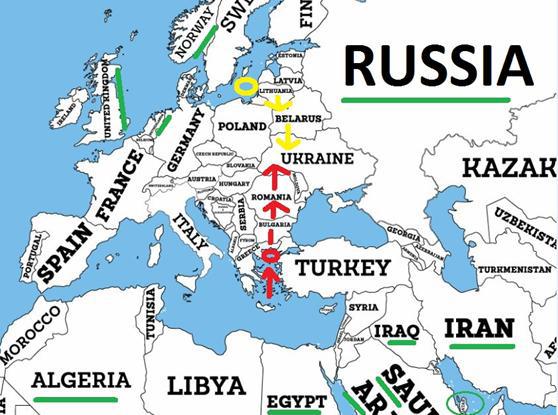
These projects are of vital importance for the European Union, because the European Union wants two things. The first one is that Eastern Europe does not to depend on Russian natural gas. This can be achieved through the TANAP and TAP projects. The second thing that the European Union wants is that Eastern Europe does not to depend on Turkey either, because Turkey is not a western country, and she is not a member of the EU. The only way that the EU can achieve Eastern Europe's energy independence from Russia and Turkey is through Greece as you can see by the red lines on the above map.
Lithuania has recently built a sea LNG terminal (see yellow lines on the above map). However Lithuania has very limited sources in order to import natural gas. For Lithuania the main alternative to the Russian natural gas is Norway, which has 2 trillion cubic meters of natural gas reserves, but is facing a falling production due to overexploitation. The second option is England, which is already importing more natural gas than she is exporting. Finally there is the choice of the Netherlands, which do not have sufficient reserves either. Greece on the other hand can receive natural gas from Algeria, Libya, Saudi Arabia, Qatar, Iraq, Iran, and the United Arab Emirates. These countries are the largest producers and exporters of oil and natural gas in the world. Therefore Greece is very important for the European Union's energy security, especially for Eastern Europe.
Picture 66
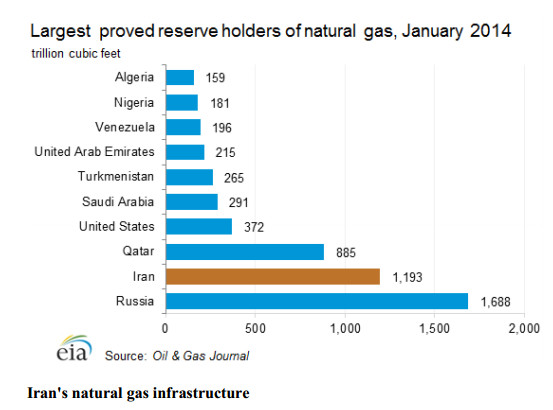
http://www.eia.gov/countries/analysisbriefs/Iran/iran.pdf
Therefore Russia does not benefit from a large and peaceful Greece, because a large and peaceful Greece which belongs to the European Union would have to accept the TANAP-TAP projects. Greece would also have to accept the pipeline connecting Greece-Bulgaria, and a sea LNG platform in North Aegean, both financed by the EU, in order to supply Bulgaria and Eastern Europe with natural gas. The IGB and the sea LNG platform would have to comply with the EU anti-monopolistic regulations. Actually that's one of the main reasons the European Union has given all this money to rescue Greece from bankruptcy. It is because of Greece's great geostrategic importance that the Europeans have been so patient with the corrupt political system of Greece.
The IGB and the sea LNG terminal hurt Gazprom, the Russian state controlled giant. If Greece was to go to war with Turkey, both the TAP and IGB projects would be cancelled, and Russia's economic interests would not be hurt. Therefore Russia has a motive to use her huge political influence in Greece in order to make Greece more aggressive towards Turkey.
This is a strange situation. Turkey, a traditional rival for Greece, might have a motive not to attack Greece, in order not to jeopardize the Southern Energy Corridor, and Russia, a traditional ally for Greece, might have a motive to push the corrupt Greek political system into a war with Turkey in order to block the Southern Energy Corridor. It is clear that Greece is facing huge threats at the beginning of the 21st century. If Greece were to exit the Eurozone and the European Union, as most Greek communists and national socialists want, and if Greece were to block the TANAP, TAP and IGB pipelines, in order to promote the economic interests of the Greek political system and Russia, she would put herself in a very dangerous position.
Turkey and Albania could annex her northern part, because she would knew that the US and the EU would not give a damn about Greece. In such a catastrophic scenario Greece could only expect help from Russia, because Russia would arm Greece in order to block the Southern Energy Corridor. The question is whether Greece will dare to exit the Eurozone and the European Union, in order to become a complete Russian satellite, which would allow the rotten Greek politicians to avoid the reforms expected by them from the European. Can the corrupt political system of Greece do something which will lead to Greece's partition? Could Greece commit suicide?
The Greek political system does not like the European Union very much lately, due to the reforms that the Europeans expect from Greece. For example the European Union expects Greece to establish independent tax and judicial authorities, which will not be controlled by the Greek political system. In other words the European Union expects Greece to become a modern European country, and stop being a Balkan country. The Europeans also expect the Greek political system to open up the energy market, according to the European Union energy regulations.
The problem is that the tax system, the judicial system and the energy market in Greece, all work for the benefit of the Greek political system. Therefore these days the Greek political system does not like the Europeans, and the problem is that the Greek media are controlled by the Greek political system, which means that Greek people are subjected to heavy propaganda. Before predicting whether it is possible for Greece to leave the EU and commit suicide, it is very useful to briefly outline Greece's foreign relations after World War 2.
After WW2 Greece was allocated to the West i.e. to what is today called NATO, while all the other Balkan countries were allocated to the East and the Soviet Union. After the war there were two strong political forces in Greece, the national socialists and the communists. In Europe national socialists and communists were close allies until the Nazis attacked Russia in 1941. After the German attack on Russia the nazis and the communists became the deadliest enemies in all European countries. But for the period 1939-1941, Nazis and Communists were very close. In 1939 Hitler and Stalin had signed the Molotov-Ribbentrop Pact, according to which Nazis and Communists were splitting Eastern Europe into spheres of influence. The Nazis would take Poland's eastern part, and t















